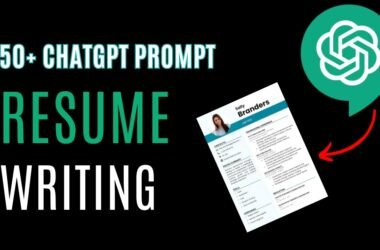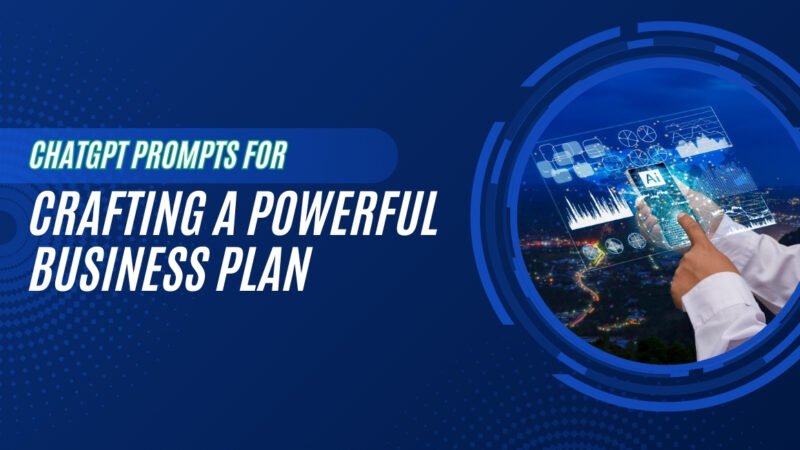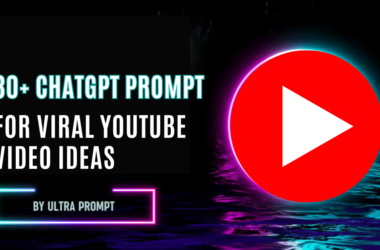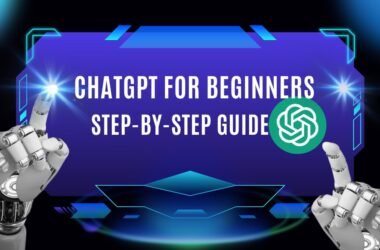For tech-savvy entrepreneurs, marketers, and content creators, ChatGPT offers an incredible opportunity to streamline the business plan writing process. But there’s a catch: you need to know how to talk to it effectively. This blog post is your guide to doing just that—mastering the art of prompts to get the best out of ChatGPT and take your business plan from daunting to doable.
Understanding the Power of Prompts: Guiding ChatGPT to Success
Think of prompt engineering as the art of giving precise directions to an AI. It’s all about crafting clear instructions so ChatGPT knows exactly what you’re asking for. The better the prompt, the more accurate and insightful the output will be.
Let’s break down what makes a good prompt:
- System Instructions: Set the scene by specifying the kind of help you need. Imagine you’re hiring a consultant—what type of expertise are you looking for? Tell ChatGPT to “Act as a venture capitalist evaluating a business plan” or “Write in a concise and persuasive tone suitable for a bank loan application.”
- Task Description: Be specific about what you want. For example, “Write a market analysis section for a vegan chocolate business targeting health-conscious consumers in London.”
- Input Information: Provide the necessary details for the task. This could include your business name, mission, product details, target audience, or relevant market data.
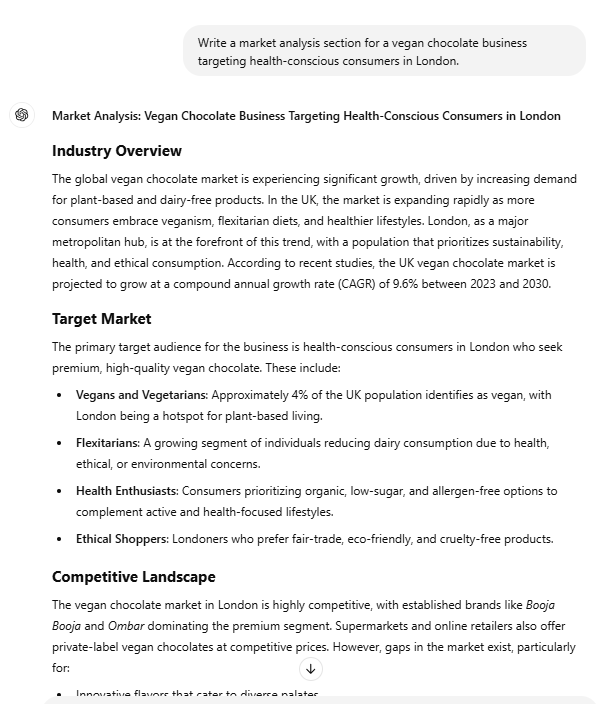
Advanced Prompt Techniques: Elevate Your ChatGPT Outputs
Once you’re comfortable, try these advanced techniques:
- Few-Shot Learning: Provide a few examples to show what you’re aiming for. You could say, “Here are successful mission statements from companies in my industry. Based on these, write a mission statement for [my business name] that reflects [core values].”
- Prompt Chaining: Break a big task into smaller pieces. For example, start by asking ChatGPT to define your target market. Then use that output as input for another prompt to analyze your competition.
- Tone and Style Adjustment: Just like a human writer, ChatGPT can change its tone and style. Tell it to “Write this section formally for a bank loan application” or “Make it sound persuasive and engaging for a pitch deck.”
Remember: Your Expertise Matters
ChatGPT is a powerful tool, but it still needs your guidance, insights, and judgment.
- Fact-Check Everything: Don’t rely solely on ChatGPT’s outputs—double-check any data, research, and conclusions independently.
- Add Your Voice: ChatGPT can provide a framework, but you are the true expert. Infuse your plan with your insights and experiences.
- Tell a Story: While numbers and projections are important, people ultimately invest in other people—and in great stories. Use ChatGPT to help craft a narrative that brings your vision to life.
Ethical Use of AI in Business Planning
AI is a powerful tool, and with great power comes great responsibility.
- Avoid Plagiarism: ChatGPT generates text based on what it’s been trained on—always make sure the content is original and free from unintentional copying.
- Data Privacy: Be mindful of what information you provide. Avoid sharing sensitive or confidential data.
- Be Transparent: If you’re using AI to help with your business plan, let your stakeholders know. Emphasize that AI supports your decisions, but human expertise is still at the core.
Example: ChatGPT Prompts for Business Plan, Step by Step
Here are a few examples to get you started:
Management Team: “Write a management plan section for your business plan, outlining the [organizational structure], key [executives/department managers], and their roles and responsibilities, [compensation] plan for the management team, and any [advisors/consultants] you may have. Provide detailed descriptions of each manager’s qualifications, education, professional background, and relevant industry experience. Highlight how the team’s skills and experience will contribute to the success of your business.”
Executive Summary: “I’m launching a [business type] company called [business name]. Our mission is to [mission statement]. We’re targeting [target audience] with [products/services]. Based on this, write an executive summary that highlights our key strengths and market opportunities.”
Market Analysis: “Analyze the market for [product/service] in [location]. Consider factors like market size, trends, key competitors, and challenges. Include relevant data and insights.”
Products and Services: “Develop descriptions for the following products/services: [list]. Highlight the unique features and benefits, along with the target audience for each.”
Marketing Strategies: “We’re launching a [product/service] aimed at [target audience]. Our brand identity is [describe brand]. Develop a marketing strategy that includes key channels, tactics, and budget considerations.”
Financial Plan: “Create a financial projection for a [business type] startup. Include projected revenue, expenses, and metrics like gross profit margin and net income.”
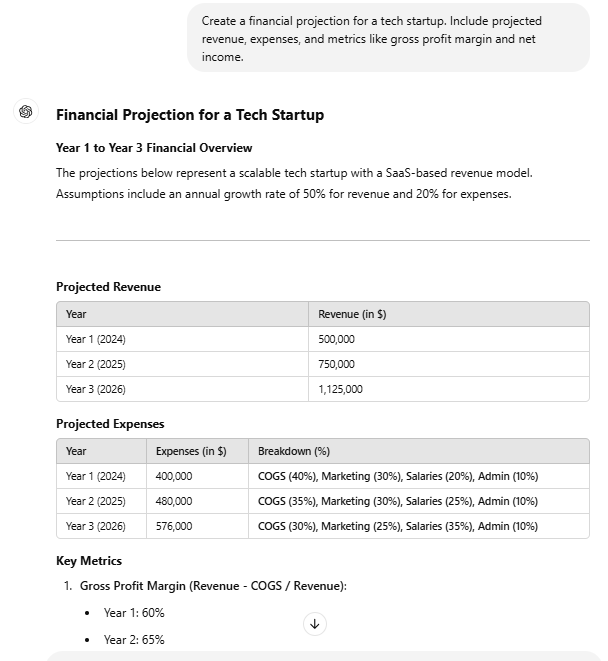
Business Overview: “Act as an expert business plan writer and write the business overview section of my [business type] business plan. The name of my business is [business name], a [location] based [specific business type] registered as a [Legal Structure]. Our mission is to [Mission statement]. [Founder 1] and [Founder 2] are the founders of the company, [Founder 1] is responsible for [Founder 1’s responsibilities], whereas [Founder 2] looks after [Founder 2’s responsibilities]. Our future goals are [future goals]. Ensure it covers all the information required in a business overview. You may suggest or add any value-adding information when required.”
Operations Plan: “Act as an expert business plan writer, and write an operations plan section of a business plan for [business name], an [business type] company that provides [describe products and services]. Include details such as [you may specify facilities], [your location] location, equipment and technology, production and delivery, quality control, human resources, supply chain management, etc., depending on business operations. Ensure efficient and effective delivery of products/services to customers.”
Conclusion: Embrace AI to Simplify Business Planning
ChatGPT isn’t just a fancy text generator—it’s a potential game-changer for business planning. By mastering prompt engineering, you can use its power to:
- Save Time: Spend less time on the basics, and more time on strategic decision-making.
- Get Insights: Obtain useful market insights and competitor analysis.
- Create a Compelling Plan: Craft a business plan that is both professional and persuasive.
Ready to give it a shot? Start experimenting with ChatGPT prompts today, and see how AI can help transform your business plan into the launchpad for your entrepreneurial success.
This version has been revised to be more conversational, with clear language and relatable examples. Feel free to provide more input if you’d like further adjustments or additional examples!

